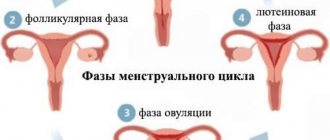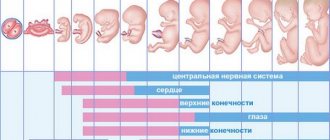It’s no secret that you shouldn’t have periods during pregnancy. But what to do if at one not very wonderful moment you notice slight spotting. Most modern women are excellent Internet users and immediately begin to look for explanations for this phenomenon on the Internet.
But unfortunately, on the World Wide Web, quite a large number of people believe that the appearance of such discharges does not threaten anything. And women, after reading such information, calm down. And completely in vain!
The absence of a monthly cycle due to the presence of the pregnancy hormone progesterone in the body should nullify all our monthly torments. And if you have similar symptoms, it means that there are some violations.
Therefore, you should not delay with this problem. Visiting a doctor will be the best way to find out what is happening in your body and how to avoid all sorts of negative consequences.
Now let’s find out what are the signs of bloody discharge or, as this phenomenon is otherwise called, washing the fetus during pregnancy.
Washing the fetus: main reasons
Unfortunately, we won’t be able to give you one reason in this matter.
So, fetal washing may occur due to the following factors:
- Formation of new blood vessels. In order for you to understand the mechanism more clearly, it is worth saying that when the embryo is implanted into one of the walls of the uterus, new blood vessels begin to form around it. Their occurrence is due to the need to deliver more blood to your unborn baby. The problem in this case can be considered the fact that each such vessel is very fragile, which means it can burst. And if this happens, the woman experiences small spotting, reminiscent of menstruation;
- Detachment of the placenta or fertilized egg. This reason is already much more serious than the previous one. And if you do not seek medical help in time, then the probability of losing your child is gradually approaching 100%. You should not think that placental abruption must necessarily end in termination of pregnancy. Of course, if complete peeling occurs, then the loss of the baby is inevitable. But if you seek medical help in time, then you can still save the child. So you shouldn’t hesitate, it’s better to go to the doctor once again and make sure that nothing bad happened, than to bitterly regret your arrogance later;
- Hormonal imbalance. During a problematic pregnancy, one of the causes of hormonal imbalance is considered to be insufficient progesterone. It is very simple to explain washing in this case: during pregnancy, after progesterone appears in the body, eggs should stop forming. This means that menstruation disappears. But if the amount of this hormone is not enough, the menstrual cycle continues, albeit in a slower manner.
Causes
Fetal washing usually occurs in early pregnancy. It happens that because of this phenomenon, a woman does not know for a long time that she is expecting a baby, because her menstruation proceeds as usual.
In the early stages of pregnancy, this phenomenon occurs like menstrual bleeding. But if the discharge is scanty and spotty, this may be a sign of placental abruption and pose a threat to mother and baby. In later stages of pregnancy, the phenomenon occurs extremely rarely. And if this happens, we can talk about problems (usually placental abruption). Therefore, in this case, the woman is placed in a hospital under medical supervision and they try to stop the detachment process - sometimes this can be done, and sometimes not.
Most often, fetal washing is a consequence of excessive growth of blood vessels around the embryo implanted in the uterus. These vessels are thinner and more fragile than the vessels of the main circulatory system, so they are often injured, which is the result of minor uterine bleeding. This condition does not pose a threat to the fetus.
Another reason for such a phenomenon as washing the fetus is the above-described abruption of the placenta or ovum. This happens for various reasons, and is an extremely dangerous condition for the mother and child, so if such bleeding, called implantation bleeding, occurs, you should immediately seek medical help. Usually, in the early stages, detachment can be stopped; when this occurs in late pregnancy, the prognosis is less favorable.
Menstruation during pregnancy
Washing the fetus is a phenomenon that, although it does not pose a threat in most cases, can cause the woman to accidentally harm herself or the child. This can especially happen when, due to the presence of blood discharge, a woman thinks that she has a regular period and therefore does not expect pregnancy.
As a result of washing the fetus, a woman can lead a normal life - smoke, drink alcohol. She may not actively protect herself from viral and bacterial agents, which is why she may develop a disease that will harm the baby in her womb. And of course, not knowing about her pregnancy, a woman will not be able to have an abortion on time if this pregnancy was unwanted at that moment in time.
That is why it is so important for the fair sex to be attentive to their health, use contraception and periodically take a pregnancy test when there is a possibility that contraception did not work or when there was unplanned and unprotected sexual intercourse.
There is such a unique reason for the occurrence of fetal washing as a bicornuate uterus. With this anomaly in the structure of the female organ, the fetus grows in one part of the uterus, and in the other, the endometrium is rejected with the development of menstruation.
Washing the fetus: what it looks like
- If you are one hundred percent sure that you are pregnant, then the appearance of a pulling sensation in the lower abdomen should alert you. And the classic symptoms of washing almost completely coincide with menstrual ones.
- Still the same pain in the lower abdomen and lower back. Do not forget about the discharge, which can be not only red, but also brown or pink.
- Another question that is of great interest to expectant mothers: how many days does the fetal washing last? On average, from two to four days. That is, again, everything is very similar to normal menstruation.
- In any case, when the first such symptoms appear, you need to urgently seek medical help, since the results of your inaction can be very disastrous. By the way, just so you know: there is no such thing as “washing the fetus” in medical terminology, so you should not be surprised at the absence of such an entry in the card after the appointment.
It is also worth remembering that the reasons for the appearance of such discharge are not limited to those that we have already listed. Unfortunately, the so-called washing can be the first indicator of the danger of miscarriage or the appearance of some pathology.
Causes and signs of fetal washing during pregnancy
Fetal washing during pregnancy most often occurs in the early stages. A woman, not knowing about conception, may perceive spotting as the beginning of the menstrual cycle. The reasons for this situation may be different:
- during the formation of a new blood circulation for the embryo. Throughout the attachment of the fertilized egg to the wall of the uterus, vessels and arteries are formed in order to provide nutrition and breathing to the baby. They are very thin and fragile and therefore some of them may burst during the formation period.
- with detachment of the fertilized egg or with placental insufficiency. The causes of this process can be various diseases of the mother, so it is worth visiting a medical facility for diagnosis and timely treatment.
- hormonal imbalance is associated with insufficient production of progesterone and suspension of the menstrual cycle, which becomes the key to successful embryo implantation.
Signs of fetal washing during early pregnancy are typical of a normal menstrual cycle. Pain in the lower abdomen and lumbar region, accompanied by discharge, often of a spotting nature, is misleading. The process continues for 2-4 days, which also suggests menstruation. Recognizing any of the symptoms should alert the expectant mother. Seeing a doctor will be the right decision, since the child’s life depends on it. Bloody discharge during pregnancy is, in most cases, associated with a pathological reaction of the body. Only medical professionals, with the help of laboratory tests, are able to determine the exact origin of the bleeding.
At what period does fetal washing most often occur?
- Most often, such bloody discharge appears around the same time as regular menstruation. Therefore, be careful and in such cases consult a doctor immediately. At first, a woman may not even be aware of her pregnancy, because if her period appears on time, then there is nothing to worry about.
- After all, no one would think that the detachment of the upper layer of the epidermis in the uterus occurs in parallel with the development of the fetus. In addition, such washing lasts exactly the same time as regular menstruation. This is why you need to monitor your cycle very carefully, especially if you are planning to have a child in the near future.
- Washing of the fetus most often occurs in the second and third trimester, although as we have already noticed, the appearance of spotting in the early stages is also not uncommon. Moreover, there is another pattern: the shorter a woman’s pregnancy, the fewer days the washing continues.
- And if in the first months there is practically no threat and if you consult a doctor in a timely manner, you can minimize all risks, then in later stages, such phenomena last for about a month. And this is already a threat to the life and health of your baby!
Consequences of freezing of the second embryo after 3 weeks
Freezing of one of the fetuses for a period of 3 weeks is not such a rare occurrence. It occurs in 2–7% of multiple pregnancies. Basically, this is monochorionic multiple pregnancy, when two or more embryos are united by a common membrane.
Naturally, a woman who learns about the death of one of the fetuses is overcome by fears: will the second child survive in such conditions? What are the risks? It is definitely difficult to answer these questions, since the consequences of the freezing of one of the fruits for the life of the second depend on the period at which the failure occurred.
Gynecologists distinguish three periods:
Up to 10 weeks of pregnancy.
The death of one of the embryos in the 1st trimester does not in any way affect the well-being of the mother and the development of pregnancy as a whole. The woman may notice some spotting, but there will be no risk of miscarriage.
There is a myth that a dead embryo will poison the second fetus, especially in the case of a common membrane, but there is no scientific confirmation of this. It’s another matter if the embryo died as a result of a genetic abnormality or congenital disease, which the second child may be exposed to. In this case, the pregnancy develops normally, but the born baby will have health problems. However, they will be caused by intrauterine pathology, and not by the death of the second fetus during pregnancy.
10-13 weeks.
At this stage, a placenta rich in blood vessels is formed. Identical twins, who have one placenta between them, have an anastomosis - the connection of blood vessels into a single channel. When one fetus dies, the second often experiences problems with blood supply.
You can check how dangerous this is by examining it using Doppler ultrasound, which clearly shows the blood flow. In the absence of abnormalities in blood circulation, the surviving fetus develops normally. In other cases (approximately 25%), brain damage develops, and the baby may be born with cerebral palsy or other pathology. The risk of death of the second fetus increases by 2 times.
Over 13 weeks
. Late pregnancy is the most dangerous, not only for the life of the unborn child, but also for the mother. She has a high risk of developing disseminated intravascular coagulation syndrome - a blood clotting disorder, as a result of which the pregnant woman increases bleeding, develops a rash in the form of bloody spots, lowers blood pressure and disrupts the functioning of some internal organs.
In this case, the woman goes to the hospital until the birth and constantly takes special medications that affect the composition and properties of the blood - anticoagulants, antiplatelet agents, angioprotectors, etc.
The surviving fetus also suffers. Due to impaired blood flow, the body of a deceased baby becomes a kind of reservoir where blood collects, and the living fetus will be drained of blood. This can be avoided if appropriate measures are taken in time.
Against the background of DVC syndrome, the mother experiences severe oxygen starvation, which increases the risk of brain damage and the birth of a child with cerebral palsy. For this reason, in the event of the death of one of the fetuses in the late term, the woman urgently undergoes a cesarean section.
Danger of pathology for the fetus
Unfortunately, washing the fetus carries serious danger. If it lasts for several months, it can lead to fetal death or miscarriage. In addition, a woman who is unaware of pregnancy can perform actions that are unacceptable for such a period: active sports, physical activity, smoking, etc. Because of this, the fetus seriously suffers.
If this condition is associated with placental abruption, then this directly threatens the death of the baby, as well as a deterioration in the woman’s condition. The risk is quite high, so you need to know how to determine the washing of the fetus, monitor your health, any changes in the body and seek medical help in a timely manner.
As practice shows, symptoms of fetal washing both in the early and later stages of pregnancy are observed in every fifth woman. And almost 99% of these women give birth to completely healthy children. But only if the pregnancy takes place under the strict supervision of a specialist. But ignoring the symptoms of fetal washing and inaction on the part of the mother can lead to significant pregnancy complications, including miscarriage and subsequent infertility of the woman.
Going through the entire pregnancy period without problems is the dream of every woman. However, this is not always possible. The discovery of any pathology should not put you in a state of panic, but it is extremely important not to ignore the symptoms that appear and immediately consult a doctor. Be attentive to yourself and listen to your body, because the health of your future baby depends on it!
Washing the fetus is menstrual flow, which cannot be avoided during pregnancy. But they should not be confused with bleeding, as they can occur at any time. The expectant mother should be aware of the seriousness of this process, as it causes serious damage to health.
But at the same time, this process cannot be called the norm, since it is not so, because as a rule, this is a signal that serious pathologies have begun in the body; naturally, they cannot be ignored. First of all, you should seek help from your attending physician, who will select the best treatment for this problem.
How to distinguish periods during pregnancy from uterine bleeding?
During menstruation during gestation, in most cases, no treatment is required, and uterine bleeding is a very dangerous condition that requires urgent treatment measures to be taken to maintain pregnancy. If even a small amount of blood appears from the vagina while pregnant, it is recommended to consult a doctor. Information on how to distinguish fetal washing from uterine bleeding is presented in the table.
| Sign | Uterine bleeding | Washing the fruit |
| Duration | 3-7 days | 1-2 days |
| Bleeding intensity | Medium or high | Weak |
| Discharge color | Bright red | Red, brown or pink |
| Consistency of discharge | Liquid, with minor blood clots | Spotting |
Symptoms
The symptoms of fetal washing are simple:
- discharge of various types (from smearing to heavy bleeding);
- painful sensations in the lower abdomen, radiating to the lower back.
In this case, symptoms arise only against the background of a positive pregnancy test or a confirmed pregnancy on an ultrasound.
The duration of such a phenomenon as washing the fetus can vary - from several days to several months. The faster the bleeding stops, the less likely the risk to the fetus and mother. If these signs are supplemented by the poor health of the pregnant woman, increased body temperature, weakness and malaise, there is a possibility that she is not faced with the washing of the fetus, but with a more severe intrauterine pathology, causing her to have a miscarriage. But even in such a situation, a timely visit to the doctor can correct the situation and prevent a miscarriage.
Share this article: Is everything in the article correct from a medical point of view? Answer only if you have proven medical knowledge Yes No
After pregnancy occurs, menstrual bleeding stops. In 15% of pregnant women in the early stages of gestation, bleeding similar to that accompanying menstruation is observed. Unlike uterine bleeding, washing the fetus during gestation in most cases is not a pathology. How to distinguish these two concepts? What are the reasons for washing the fetus? By what signs can it be recognized? Does this phenomenon pose a threat to the health of the expectant mother and baby?
Why is this phenomenon dangerous for the expectant mother and child?
This condition is detected in every fifth pregnant patient. Among gynecologists there is an ambiguous opinion regarding the danger of this phenomenon.
The majority of doctors believe that short-term bleeding during gestation does not threaten the health of the expectant mother and fetus, therefore the course of pregnancy in most women is not burdened by complications.
Despite the favorable prognosis of this phenomenon, it is not recommended to ignore it, since in a number of situations it can lead to various negative consequences:
- freezing of the fetus;
- spontaneous termination of pregnancy.
Following a number of rules can prevent these complications from occurring:
- undergo routine examinations with a gynecologist in a timely manner;
- consult a doctor immediately if even a small amount of blood appears from the vagina;
- eliminate active physical activity, replacing them with gentle sports (swimming, yoga, Pilates);
- stop smoking and drinking alcohol;
- Healthy food;
- take vitamin complexes;
- follow all recommendations of the attending physician.
Pregnancy is always accompanied by the appearance of certain symptoms. One possible symptom is fetal washing. This “common” expression refers to bleeding in the first trimester of pregnancy. As a rule, they are not abundant, but smearing.
Is it dangerous to wash the fetus during pregnancy? Medical practice shows that most women with similar symptoms give birth to healthy babies. However, it is still necessary to determine the cause of this phenomenon. Today we will try to answer some exciting questions.
Formation of new blood vessels. When an embryo implants into the wall of the uterus, a “network” of new vessels begins to grow around it. After all, now we need to “transport” more blood, right? However, these vessels are still very fragile and thin, which often leads to their damage. As a result, a woman may notice short-term spotting.
Detachment of the placenta or fertilized egg occurs. This is a serious sign of a threatened miscarriage. It happens that a woman mistakes such bleeding for washing the fetus and simply waits for it to “go away on its own.” However, in no case should you let the situation take its course, but rather go to the doctor. Delay can lead to the loss of the child or the appearance of fetal development pathologies.
Hormone imbalance. As always, all processes are controlled by “almighty” hormones. If there is a lack of progesterone in a woman’s body, then signs of fetal washing may appear during pregnancy. Why? The fact is that when pregnancy occurs, new eggs should stop maturing. The pregnancy hormone progesterone is responsible for this. Sometimes the corpus luteum does not produce enough of it, which is why symptoms of fetal washing occur.
Why can washing the fetus threaten pregnancy? It happens that a woman does not even suspect that she is already pregnant. In this case, bleeding is perceived as regular periods, especially if they coincide in dates. Such ignorance can harm the unborn child, as can bad habits (alcohol, smoking), as well as difficult working conditions and long working hours. So you need to carefully monitor your menstrual cycle and be aware of the signs in time.











